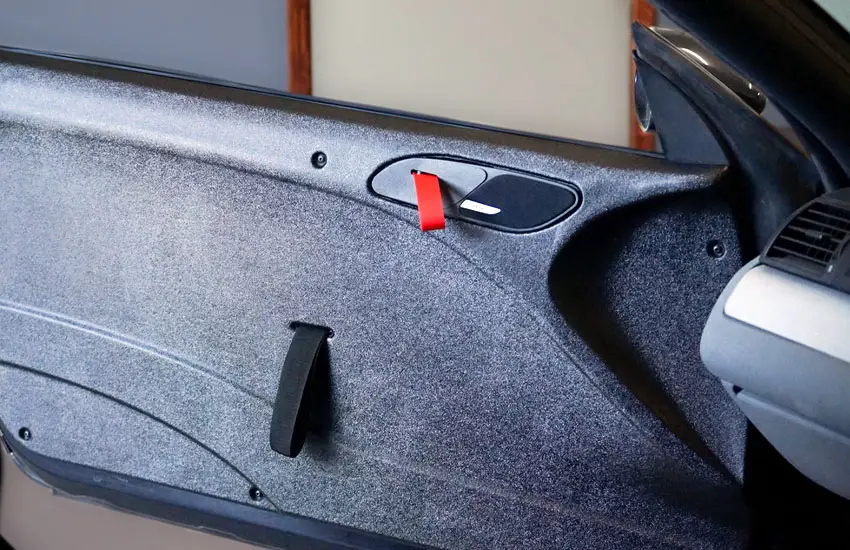As an Amazon Associate, I earn from qualifying purchases at no extra cost to you.
Silencing the Squeak: Expert Tips to Fix Car Door Noise
Anyone who has ever driven a car with a squeaky door knows how annoying it can be. The high-pitched screeching or creaking noise can be frustrating, distracting, and even embarrassing when you’re trying to enjoy a smooth ride.
Whether it happens when you open the door or during driving, a squeaky car door is not only unpleasant but could also signal a problem that needs attention. But don't worry, you don't have to take it to an expensive mechanic for repairs. With a few expert tips and simple steps, you can get rid of that irritating squeak and restore peace to your car.
In this article, we'll walk you through some effective ways to silence your car door noise, exploring various causes of squeaking, and providing solutions that will save you time and money. From lubrication techniques to checking the door components, we'll cover it all.
Common Causes of Car Door Noise
Squeaky car doors can be caused by a variety of issues, ranging from the door hinges to the rubber seals around the door frame. Understanding the root cause of the noise is crucial to fixing it. In this section, we'll break down some of the most common culprits behind the squeaky sound you hear when opening or closing your car door.
1. Worn or Dry Hinges
One of the most common causes of squeaky car doors is worn or dry hinges. Hinges are the parts of the door that allow it to swing open and closed. Over time, if they are not properly lubricated, they can start to squeak. This can be especially noticeable when you open or close the door. The lack of lubrication causes metal-on-metal contact, leading to friction and the annoying squeak.
If the hinges are left unmaintained for too long, the wear and tear can worsen, and the door's movement may become stiff, making it harder to open and close.
2. Broken or Loose Door Latches
Another cause of squeaking is broken or loose door latches. The latch is the mechanism that keeps the door securely closed when you’re driving. If this part becomes loose or worn out, it can cause squeaking noises as the door moves while you’re driving. This is especially true if you hear the squeak when driving at higher speeds or during turns, as the door may shift slightly.
Door latches can also squeak if they aren’t properly aligned or if they are stuck in an open or half-closed position.
3. Worn-out Weatherstripping
The rubber seals or weatherstripping that run along the edges of your car door can also be a source of squeaky noises. Over time, these seals can wear out, crack, or become dirty, leading to friction between the door and the frame. When this happens, you might hear a squeaky sound every time you open or close the door. A damaged seal can also allow water and dirt to get inside the door, causing further damage.
4. Misaligned Door Hinges
Misalignment in the door hinges is another common cause of squeaky sounds. If your car door is slightly out of alignment, it can rub against the frame, causing friction that leads to squeaking. The door may not close properly, or it might hang at an odd angle, making it difficult to open or shut. Over time, this can put additional stress on the door's components, resulting in a constant squeak.

How to Fix a Squeaky Car Door: Step-by-Step Guide
Now that you understand the causes of car door squeaks, let's dive into the solutions. You can take several simple steps to fix the squeak and get your door working like new. Most of these fixes can be done without professional help, and all you need is a few basic tools.
1. Lubricate the Hinges
The most effective solution for a squeaky car door is to lubricate the hinges. When you lubricate the hinges, you reduce the friction between the metal parts, which eliminates the squeak. Here's how you can do it:
Tools Needed:
- Spray lubricant (WD-40, silicone spray, or lithium grease)
- Clean cloth
- Small brush or toothbrush
Step-by-Step:
- Open the car door completely and prop it open securely.
- Identify the hinges that are causing the noise. These are typically located on the door frame, where the door attaches to the body of the car.
- Use a small brush or toothbrush to clean any dirt, grime, or debris from the hinges.
- Spray a generous amount of lubricant onto the hinges. Make sure to apply it evenly across all moving parts.
- Open and close the door several times to allow the lubricant to work into the hinges and reduce friction.
- Wipe off any excess lubricant with a clean cloth to avoid attracting dirt.
This simple fix can often solve the squeaking problem right away. If the squeak persists, you might need to replace the hinges or inspect them for any other issues.
2. Tighten or Replace the Door Latch
If your car door latch is the culprit behind the squeak, tightening or replacing it may solve the problem. Here’s how you can do it:
Tools Needed:
- Wrench or screwdriver
- Replacement latch (if needed)
Step-by-Step:
- Open the door fully and locate the latch mechanism. The latch is typically found on the car frame, where the door meets the body.
- Check the latch for any loose screws or bolts. Use a wrench or screwdriver to tighten them if necessary.
- If tightening the latch doesn’t fix the squeak, inspect the latch for wear and tear. If it looks damaged, you might need to replace it.
- To replace the latch, use the appropriate tool to remove the old latch and install the new one.
- Test the door by opening and closing it several times to make sure the latch is working properly.
Replacing a broken or loose latch can stop the squeak and improve the overall security of your car door.
3. Replace the Weatherstripping
If the squeak is caused by worn-out weatherstripping, replacing the rubber seal can make a big difference. Over time, the rubber can lose its elasticity, crack, or collect debris, causing friction against the door. Here’s how you can replace it:
Tools Needed:
- Replacement weatherstripping
- Utility knife or scissors
- Adhesive (if necessary)
Step-by-Step:
- Open the car door and inspect the rubber weatherstripping along the edges of the door frame.
- If the rubber is cracked or damaged, remove the old weatherstripping by gently pulling it away from the door frame.
- Clean the area where the old seal was attached to remove any dirt or adhesive residue.
- Cut the new weatherstripping to match the length of the door frame.
- Attach the new weatherstripping by pressing it into place. Some weatherstripping may come with adhesive backing, while others may require additional adhesive.
- Close the door and check for any gaps between the door and the frame. If the weatherstripping is properly installed, it should eliminate the squeak.
This solution is especially effective if the squeak is coming from the edges of the door and not the hinges.
4. Check for Misalignment
If the squeak persists even after you’ve lubricated the hinges and replaced the weatherstripping, it's possible that the door is misaligned. Here's how to fix it:
Tools Needed:
- Wrench or screwdriver
- Shim (if necessary)
Step-by-Step:
- Open the door and visually inspect the alignment. Look for any gaps between the door and the frame. The door should sit flush with the frame when closed.
- If the door seems misaligned, loosen the screws or bolts on the hinges using a wrench or screwdriver.
- Gently move the door to the correct position, ensuring that it is aligned properly with the frame.
- Tighten the screws or bolts once the door is in the right position.
- Close the door and check for any squeaks or misalignment.
I hope this guide has helped you understand the causes of squeaky car doors and provided useful tips to fix them. Whether it's lubrication, replacing the weatherstripping, or realigning the door, there are simple solutions you can try at home to restore peace and quiet to your vehicle. With a little effort, you can eliminate that annoying squeak and get back to enjoying your drive.
Are These Questions in Your Mind?
Is it safe to use WD-40 to lubricate the hinges?
WD-40 can be used for lubrication, but it is not the best long-term solution. It's great for quick fixes but tends to attract dirt. A silicone-based lubricant or lithium grease is a better option for longer-lasting results.
Can a squeaky car door be dangerous?
While a squeaky door itself is not dangerous, it can be a sign of an underlying problem, such as a loose latch or misaligned door. If left unchecked, it could lead to further damage, so it's always best to address the issue promptly.
Do I need to replace the door if it's misaligned?
Not necessarily. Most door misalignments can be fixed by adjusting the hinges. However, if the misalignment is severe or caused by structural damage, replacement may be needed.
Is it possible to fix the squeak without opening the door?
It's highly unlikely. To properly address the squeak, you need to access the hinges and other parts of the door, which can only be done when the door is open.
Can the squeak be caused by the door frame?
Yes, in rare cases, the door frame could be the cause of the squeak. If the door is properly aligned and the hinges are lubricated, but the squeak persists, inspect the door frame for any damage or misalignment.
Is there a quick fix for a squeaky door?
A quick fix is to spray some lubricant directly onto the hinges. However, this may not be a permanent solution, especially if the problem is caused by wear or misalignment.
Do I need professional help to fix a squeaky door?
Most car door squeaks can be fixed with a few basic tools and some time. However, if the problem is severe or involves structural issues, it's best to consult a professional.
Can I fix a squeaky door in the winter?
Yes, but be aware that cold temperatures can cause lubricants to thicken or become less effective. In cold weather, use a silicone-based lubricant designed for low temperatures.
Is it possible to fix the weatherstripping myself?
Yes, replacing weatherstripping is a relatively simple DIY task that doesn't require professional help. Just be sure to buy the correct replacement part for your car model.
Can a squeaky car door cause a water leak?
Yes, if the weatherstripping is damaged, it can lead to water leaks. Replacing the weatherstripping can help prevent this issue and keep your car dry.











